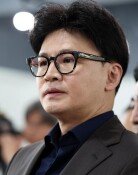Hwang Jini

Two volumes, 274 and 282 pages, 9,000 won, Written by Jeon Gyeong-rin
I thought I could see Hwang Jini in a new perspective as a woman.
This is an unexpected answer I received from Jeon on my question, Why did you write about the old fashioned Hwang Jini story in modern days? For Jeon Gyeong-rin (42), it has been 10 years since her first debut as a novelist. This novel has the genuine Hwang Jini being formulated and touched by a female writer for the first time, believe it or not.
While looking at old documentary records relevant to Hwang Jini, I felt that many parts are distorted by a male perspective and description. In some ways, they seemed to have malicious intents.
Why did they resist Hwang Jinis temptations and identify themselves as men of fidelity? Is the proscription against temptation and love oppressive?
So, Jeon changed the novels plot. Hwang Jini does not tempt classical scholars who enjoy intellectual pleasure. In the novel, those classical scholars pursue higher positions called self-development and finally ruin their lives. The Byeok Gye-su anecdote does not appear (in which a novel man who self-confidently declared that he would never be seduced by Hwang Jinis temptation, but who ultimately became a slave to Hwangs love).
Is this due to the changes by Jeon? Contrary to the previous texts on Hwang Jini that showed her arousing and aggressive actions, the novel by Jeon Kyeong-rin does not write about Hwangs arousal choices. Her unique temperament, which makes people feel bashful and miserable by the hiding of her haughty attitude, is preserved; however, her choices are so genuine and giving, so that you easily empathize them earnestly and sorrowfully. The author does not put down the reason of her sadness on a personal level. It was the gigantic oppressive structure of the Chosun dynasty that made her grieve.
During the Chosun dynasty, the lives of women were trapped as the discrimination between legitimate children and illegitimate children occurred, and with the Keonggukdaejeon (經國大典.the first code in Chosun dinasty), completed by King Seong-jong. Once the society started to conform people to the frame of authority, does it ignore the happiness and rights of the minority such as women? Originally, every fundamentalism commits this fault.
The author intentionally crashes little Hwang Jinis life out of the blue to emphasize the sorrow. In the most previous text, Hwang Jini determines her way when the funeral bier of a man who died of lovesickness stops in front of her house. On the contrary, Jeon created her Hwang Jini reborn as Myongwol after discovering her birth secret that she is the daughter of a blind geisha and stuck in a caste even though she grew up as a literary woman in a novel family.
It catches attention that the love partner in this new Hwang Jini is Lee Sa-jong. He cohabited with her for six years based on their contract. Some people can interpret him as an unreliable man. So the author set their first meeting at their young ages.
First, the author sets the hopeless love between Hwang Jini and Lee Sa-jong, who is pessimistic about the society discriminating between legitimate children and illegitimate children, and then puts him standing in front of her after making himself visible using the power of love. However, this emergent love cannot be something beyond contract. It was a natural combination to have a successful man with a lawful wife, family, system, and ideology in the Chosun Dynasty.
Compared to the long human revolutionary history, women in the 1500s and today do not show many differences.
Jeon emphasized, The most important thing in the human world is the confidence accomplishing love; this is her philosophy and Hwang Jini would not deny this, according to her.
Something that I share with Hwang Jini? We are trusting people who live the present life facing struggles, and we do not acknowledge the established system and power. Differences? Maybe, the fact that I am not as attractive as her.
Yoon-Jong Yoo gustav@donga.com






